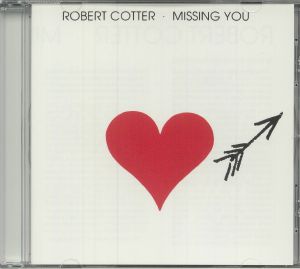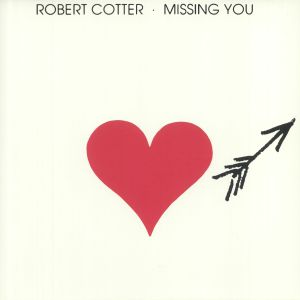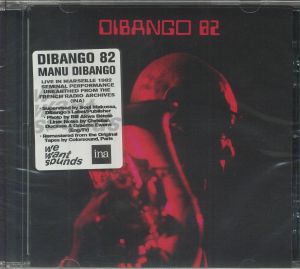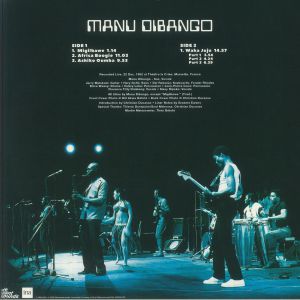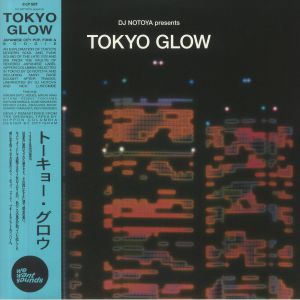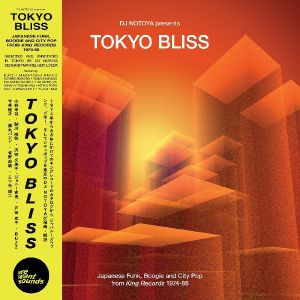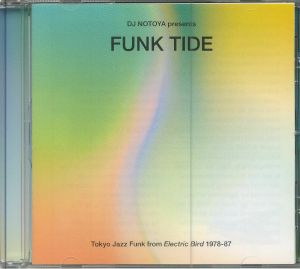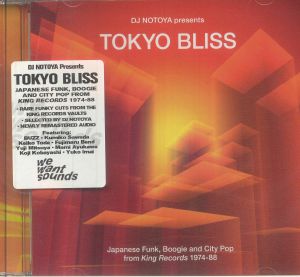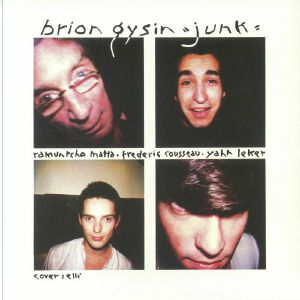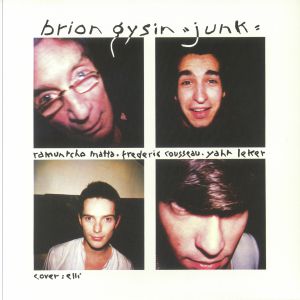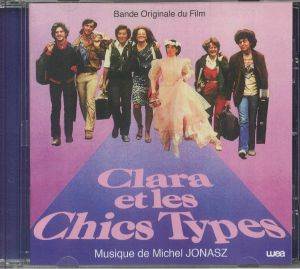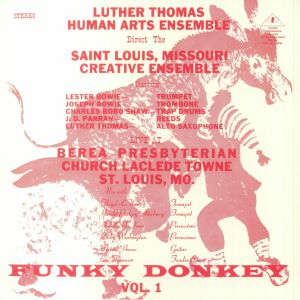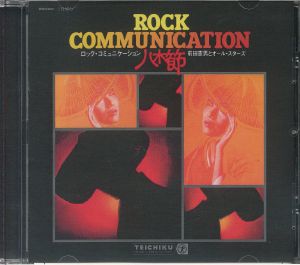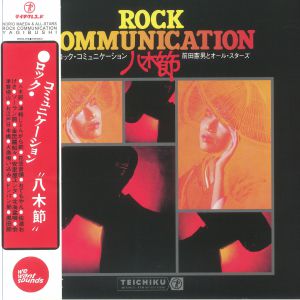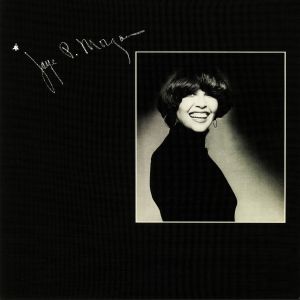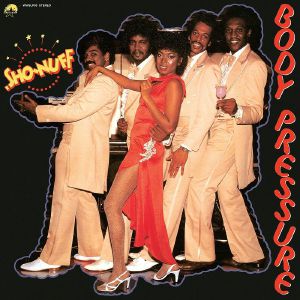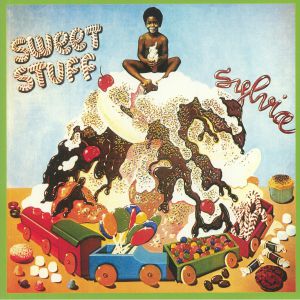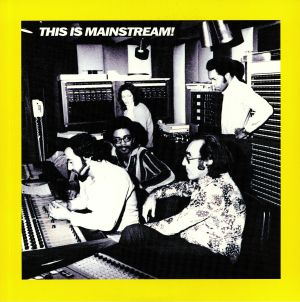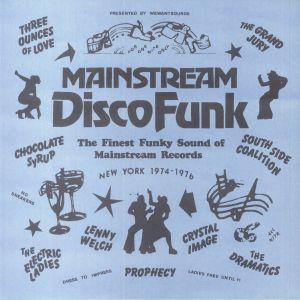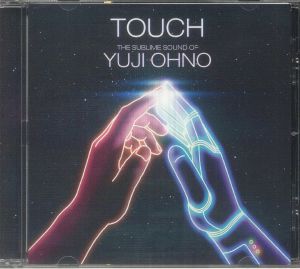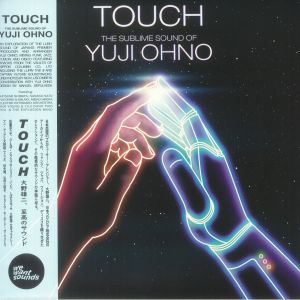Filter
在庫状況
音楽
アーティスト
レーベル
Featured
リリースタイトル
値段
タグ
Back catalogue: Funk Soul & Jazz
Juno's full catalogue of Funk Soul & Jazz
アルバム
in stock $19.51
in stock $30.09
Played by: Juno Recommends International
in stock $20.06
Review: Manu Dibango knew how to work a crowd. By the time he hit the stage at Marseille's Theatre La Criee in December 1982, he had long mastered the art of turning a gig into a full-blown celebration. This was the man who took makossa global, who made 'Soul Makossa' an international sensation a decade prior and who could pivot between jazz, funk and African rhythms like it was nothing. The recording, unearthed from the INA archives, captures him in peak form, leading an eight-piece band through a set that refuses to sit still. 'Africa Boogie' is all clipped guitars, tight horns and a bassline that struts like it owns the place. 'Ashiko Oumba' turns the groove alluringly, locking into intricate polyrhythms before erupting into pure brass-fuelled joy. Then there's 'Waka Juju', sprawling across three parts, moving from simmering tension to full-throttle release with the kind of control only Dibango could pull off. He's conducting, shaping the music in real-time, every solo a conversation, every break a setup for the next explosion of sound. Four decades later, the set still feels alive. It's there in the call-and-response with the crowd, the sweat-soaked momentum of a band that knows it's on fire. Dibango, effortlessly cool at the centre of it all, proves once again why his music never ages.
… Read morePlayed by: Juno Recommends International
in stock $36.52
DJ NOTOYA / VARIOUS
Tokyo Glow (remastered) (gatefold 2xLP with obi-strip)
Cat: WWSLP 55. Rel: 10 Dec 21
Review: The recent Tokyo Dreaming compilation on Wewantsounds was a huge success so the label does the right thing and follows it up with another collection of sounds from the Far East. This one again looks into the fascinatingly niche city pop sound with expert digger DJ Notoya at the wheels. He delves into the Nippon Columbia catalogue and turns out all manner of breezy and laidback gems from Hiroshi Sato, Hitomi "Penny" Tohyama, Midori Hara and more. In many cases, these tunes are making it tot vinyl for the first time. What's more, the audio has been newly remastered in Tokyo for this reissue making sure it sounds as good as possible.
… Read morePlayed by: Ex-Friendly (Truth & Lies Music), Dynamite Cuts
in stock $36.52
DJ NOTOYA / VARIOUS
Tokyo Bliss: Japanese Funk Boogie & City Pop From King Records 1974-88 (LP with obi-strip)
Cat: WWSLP 98. Rel: 13 Feb 25
Review: DJ Notoya returns with another expertly curated selection of Japanese gems, this time delving into the funky, soulful, and city pop sounds of King Records. Spanning the years 1974 to 1988, this compilation is a treasure trove of forgotten classics and hidden gems, a sonic time capsule that transports listeners back to the neon-lit streets and vibrant nightlife of 1980s Japan. Buzz's 'Garasumado' kicks things off with an infectious groove and funky guitar riffs that could rival any Western funk classic. Mami Ayukawa's 'Sabita Gambler' adds a touch of soulful sophistication, her smooth vocals gliding over lush instrumentation. Keiko Toda's 'Fade In' is a city pop gem, its dreamy melodies and catchy hooks evoking a sense of carefree optimism and urban cool. Elsewhere, Johnny Yoshinaga's soulful ballad 'The Rain' provides a moment of introspection, while Kumiko Sawada's disco-infused 'Your Love's Away' will get you moving and grooving. The compilation closes with the feelgood sounds of Masatoshi Kanno's 'Day By Day', a perfect encapsulation of the city pop aesthetic.
… Read morePlayed by: Nick Anthony Simoncino, Juno Recommends Funk
in stock $35.13
DJ NOTOYA / VARIOUS
Cat: WWSCD 81. Rel: 14 Mar 24
in stock $15.33
DJ NOTOYA / VARIOUS
Cat: WWSCD 98. Rel: 13 Feb 25
Review: Adding to the fervour around Japanese city pop - the genre is still a clogged but speculative seep for reissuers, who are keen to capitalise on the mainly Tokyo-born genre's still underground, under-recognised reserves of music - comes DJ Nutoya with a fresh and terse ten-tracker compilation: Tokyo Bliss. This breezy selection centres on the all-rounder genre's favourite international foci, boogie and funk: frissonic formulas for sensational home listening. Most tracks here make their debut on vinyl outside of Japan; from Buzz's pristine tremolo'er 'Garasumado', to Keiko Toda's escape-noteworthy 'Fade In' and Yuji Mitsuya's delirious summer disco dirge 'After Five At Caf-Bar', this is an impeccable curation job.
… Read more in stock $18.40
Junk (remastered) (B-STOCK) (LP + insert)
Cat: WWSLP 79 (B-STOCK). Rel: 01 Jan 90
B-STOCK: Sleeve damaged, record slightly warped
Review: ***B-STOCK: Sleeve damaged, record slightly warped***
Brion Gysin was a true original who left his mark on modern culture when he introduced William Burroughs to the cut-up technique, but he also recorded a swathe of experimental, funk-fuelled releases including the 1983 single 'Kick/Junk'. That single has been expanded into this album for Wewantsounds, which features Don Cherry's trumpet work on 'Kick' amongst many other talented players. It's a freewheeling listen which takes its inspiration from many places, finding space for tender folk experimentation with an African twist on 'All Those Years' and embraces jazz as a vessel for sonic and rhythmic exploration when the moment calls for it.
… Read moreBrion Gysin was a true original who left his mark on modern culture when he introduced William Burroughs to the cut-up technique, but he also recorded a swathe of experimental, funk-fuelled releases including the 1983 single 'Kick/Junk'. That single has been expanded into this album for Wewantsounds, which features Don Cherry's trumpet work on 'Kick' amongst many other talented players. It's a freewheeling listen which takes its inspiration from many places, finding space for tender folk experimentation with an African twist on 'All Those Years' and embraces jazz as a vessel for sonic and rhythmic exploration when the moment calls for it.
in stock $28.43
Review: Brion Gysin was a true original who left his mark on modern culture when he introduced William Burroughs to the cut-up technique, but he also recorded a swathe of experimental, funk-fuelled releases including the 1983 single 'Kick/Junk'. That single has been expanded into this album for Wewantsounds, which features Don Cherry's trumpet work on 'Kick' amongst many other talented players. It's a freewheeling listen which takes its inspiration from many places, finding space for tender folk experimentation with an African twist on 'All Those Years' and embraces jazz as a vessel for sonic and rhythmic exploration when the moment calls for it.
… Read morePlayed by: THE REFLEX
in stock $37.08
Cat: WWSCD 84. Rel: 05 Dec 24
in stock $17.57
Funky Donkey Vol 1 (remastered) (LP + insert)
Cat: WWSLP 85. Rel: 09 Nov 23
Review: Jazz doesn't come much more wildy expressive, idiosyncratic, off the cuff, challenging and dense that this album from 1977. The Human Arts Ensemble came together in 1970 in St. Louis adn was a loose collective that associated themselves with the Association for the Advancement of Creative Musicians (AACM) and the Black Artists' Group (BAG) collective. They had no rues and no restrictions on who could play and it shows as different instrments shoulder their way to the front and vie for attention, from the drums to the keys, the sax to the double bass. This reissue features the original artwork as well as all new remastered audio and fresh liner notes by Howard Mandel that provide great context.
… Read morePlayed by: Ex-Friendly (Truth & Lies Music)
in stock $37.36
in stock $15.88
Rock Communication Yagibushi (limited gatefold LP + insert with obi-strip)
Cat: WWSLP 89. Rel: 13 Jun 24
Review: Norio Maeda's Rock Communication Yagibushi, originally released in Japan in 1970, now comes reissued on Wewantsounds. Rock Communication Yagibushi has since become a Japanese jazz-funk cornerstone, owing to its incredible, complex mutative movement of 14 traditional Japanese folk songs into jaw-dropping jazz-funk versions. Maeda's killer arrangements fit perfectly somewhere on the stylistic intersection of David Axelrod and Lalo Schifrin; the album likewise is increasingly experimental as it progresses, with the big band bombast of the likes of 'Saran Bushi' mixing seamlessly yet also contrastingly with the vibraphonic improv shakedown 'Edo Nihonbashi', our highlight.
… Read morePlayed by: THE REFLEX
in stock $35.13
Jaye P Morgan (reissue) (LP + booklet + MP3 download code)
Cat: WWSLP 20. Rel: 23 Jan 19
Review: When popular 1950s singer Jaye P Morgan first released this eponymous album in 1976, she would undoubtedly have hoped it would reignite her career. Sadly it didn't, but the album - a curious but hugely enjoyable mix of saccharine, synth-laden slow jams, disco-fired dancefloor workouts, Broadway style torch songs and fuzzy funk - went on to become a cult classic amongst Balearic-minded diggers. As this essential reissue proves, much of the material has aged rather well. Check, for example, the laidback AOR disco chug of "Can't Hide Love", the Barry White style seductiveness of "Here Is Where Your Love Belong" and the spine-tingling rush of Morgan's killer disco cover of Detroit soul staple "You're All I Need To Get By". Don't sleep!
… Read more in stock $37.91
Review: Funk and soul group Sho Nuff were already beneficiaries of such greats as Stax Records and Malaco before their fourth LP, now reissued here through Wewantsounds, came out via the Japanese music racket King Records. Whilst their earlier records saw wide promotions in the US, Body Pressure heard the sextet relocate their appeal to the Japanese market, after having toured regularly in the Eastern isle after their prior album Stand Up For Love saw only modest sales success. Now well into their early-mid 80s embrace of boogie, the likes of 'Body Pressure', 'Monster Monster' and 'Is This For Real' hear unique pan-Asian collaborative panaceas, with recordings from Japanese funk jazz guitarist Takao Naoi standing out most notably on this sizzler.
… Read morePlayed by: Mukatsuku Records Chart
in stock $35.13
in stock $31.50
in stock $34.56
VARIOUS
Mainstream Disco Funk: The Finest Funky Sound Of Mainstream Records 1974-76 (remastered) (LP + insert)
Cat: WWSLP 66. Rel: 23 Feb 23
Review: On their latest must-check compilation, Wewantsounds has brought together a bunch of rare early disco and disco-funk gems originally released by Bod Shad's Mainstream Records - an imprint better-known for its jazz and jazz-funk output - during the mid 1970s. Most of the material on show was originally released on now hard-to-find 7" singles, allowing Wewantsounds to present both vocal and instrumental takes of a handful of killer cuts. Highlights include the Clavinet sporting, low-down disco brilliance of The Grand Jury's 'Music Is Fun To Me', the soaring, disco-soul brilliance of 'We've Got Together (Brotherly Love)' by Chocolate Syrup, the classically orchestrated disco surge of Crystal Image's 'Gonna Have a Good Time', and the slow motion swell of The Electric Ladies' 'Nothing Between Us'.
… Read more in stock $33.44
Played by: THE REFLEX
in stock $18.40
Played by: RUSTAM OSPANOFF.
in stock $34.30

 USD
USD





